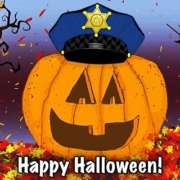The Complacency Monkey Shares Street Survival Tips for Officers
Law Enforcement. The job is dangerous, no doubt about it. Driving at high speeds. Guns. Bullets. Knives. Fights. Bombs. Well, you get the idea.
So what can officers, fictional or real, do to stay safe in a world where bad guys have no problem with taking pot shots at anyone, anytime? Certainly there’s no guaranteed method of living to see tomorrow, but cops are trained survivors. They’re taught the things they need to do to make it home at the end of the day, and they’re definitely taught the things officers should NOT do.
Unfortunately, with time, convenience often wins over safety. And let’s face it, a false sense of cozy well-being and street survival do not play well together. The complacency monkey that often hangs over the heads of both new and seasoned officers is very real and very dangerous
So, what can officers do to rid themselves of the deadly monkey?
1. Search. Search. Search. And search again! – Always search suspects thoroughly before placing them inside your patrol car. Never assume your partner searched the guy.
2. Handcuff, handcuff, handcuff – Always handcuff suspects, and always handcuff to the rear. Never, ever cuff anyone with their hands in front no matter how passive they may seem. The exception, of course, is when transporting jail or prison inmates to court and other locations. Those situations occur long after an arrest when adrenaline and the desire to flee or fight is greatly reduced. Still, some prisoners are escape risks and/or a danger to the officers and others and extra precautions should should be taken to avoid trouble. For example, the use of waist chains, leg irons, hinged cuffs, deadbolt locking cuffs, and black box or other handcuff covers to prevent shimming or lock-picking.
Safety first. It’s impossible to undo an assault, or death.
3. Hands – Always watch the hands. They can be used as deadly weapons. Always make the bad guy show his hands and keep them where you can see them.
4. Relaxing is for home, the beach, and at ball games. While at work, however, never let down your guard when answering a call of any type. Each and every person encountered has the potential of harming or even killing you. And, speaking of relaxing, get plenty of rest during your off time. There’s nothing worse than being partnered with someone who’s sleepy, not alert, and not functioning at the top of their game.
5. Upper hand – Officers should always maintain control of the situation. Assume an advantageous position and keep it. Do NOT let the suspect move into a better tactical position than yours.
6. The Cop’s Sixth Sense is rarely ever wrong. If something doesn’t feel right to you then it’s probably not. Regroup. Back out. When unsure, wait for backup. And that brings us to #7.
7. A dead hero will always be dead. There’s no shame in waiting for the cavalry to arrive. Do not enter into a dangerous situation alone, if possible. Sure, we all know there are times when you have to do some things that civilian folks would never do, but don’t be stupid.
8. Good equipment. Be sure all your equipment is in top-notch shape—radios working, handcuffs free of anything that’ll prevent them from locking in place, weapons are super clean, oiled, and ready to fire, OC spray is not out of date (be sure to shake the can once in a while to keep the ingredients well-mixed), ammunition is clean, magazine springs are in superb condition, etc.
9. Drive safely. Use the tips you were taught in the academy. Two hands on the wheel (let your partner work the radio and lights, if you have a partner). Never follow the suspect’s tail lights unless you intend to follow him off a cliff. Be aware of your surroundings at all times. BACK OFF the pursuit if you’re uncomfortable with the speed you’re traveling. Remember, the bad guy can’t outrun your radio. You already have the license number and description of the car, right? One dumb bad guy getting away is not worth your life. Never.
10. ALWAYS wear your vest. Wear reflective gear when directing traffic or at accident scenes. Use flares when needed. Get plenty of exercise and eat well and eat healthy food. And train, train, and train!
Spend time with your family.
The Monkey Song
“Here we go ’round the dry thistle
Monkey can climb but I can whistle
He can’t sing and I can’t dance
And the monkey don’t have to wear no pants.” The Nitty Gritty Dirt Band, “The Monkey Song”





